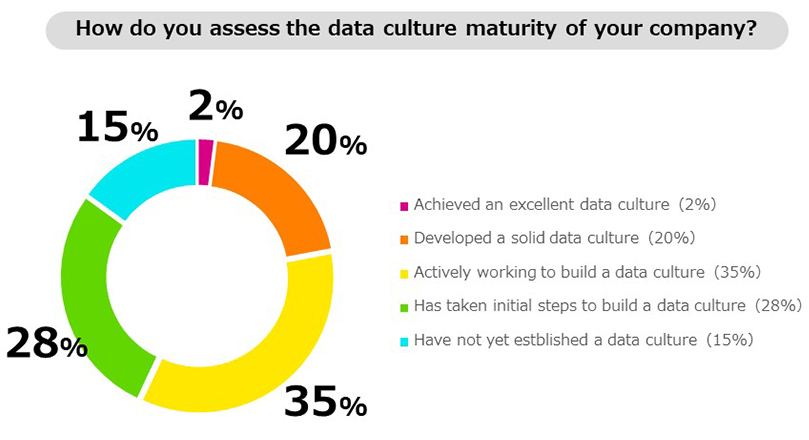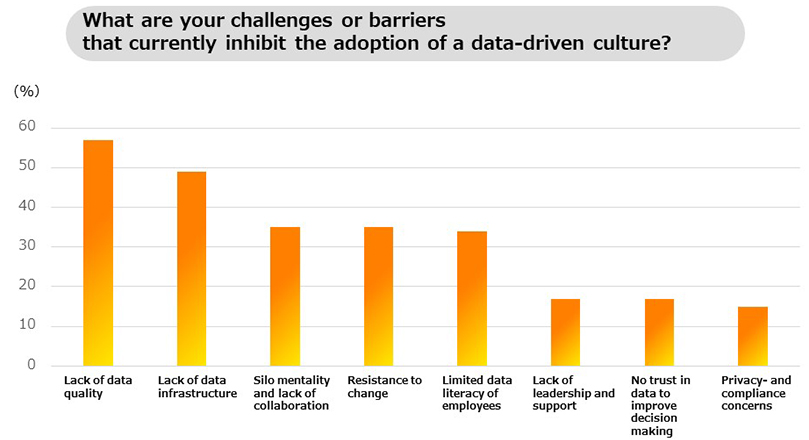Future-proofing data-driven management for sustainable corporate value enhancement
Article|2025-1-15
10 minute read
The tide of "digital Darwinism" is sweeping the global society and economy. If Charles Darwin, one of history’s most revered naturalist, applied his theory of evolution based on the survival of the fittest to today’s business landscape, he would see a world in which companies that lag behind in responding to irreversible technological evolution may lose their competitiveness at an accelerating rate. After all, survival isn’t guaranteed.
As a company that both creates and uses technology, Fujitsu is rapidly advancing digital transformation (DX) efforts that transcend national, regional and departmental boundaries. Linking DX to sustainable growth means that we are also working on company-wide reforms and pioneering new growth areas.
In this article, Takeshi Isobe, Representative Director, Corporate Vice President and CFO (Chief Financial Officer) of Fujitsu, confronts the age of drastic change head-on, taking us on a journey into the data and technology that is driving opportunities for improvements in sustainable corporate value, the deployment and challenges of an Enterprise Resource Planning (ERP) system that makes the most of data as a strategic asset, the goals of data-driven management, and the potential for using artificial intelligence (AI) to refine the true value of data-driven management.
In this era of unprecedented shifts, which is likely to continue for the foreseeable future, companies are being asked to commit to sustained improvement in corporate value. For CFOs that means an expectation to implement key strategies to drive business growth and generate cashflow—while staying aligned with the times. In turn, the cashflow generated should be allocated to further improve corporate value. Bringing about this kind of virtuous cycle will lead to continued high praise from the market.
Let’s take a look at how Fujitsu and its customers are combining their practical knowledge to create integrated knowledge that will provide hints for creating new value from a technology-driven perspective. Fujitsu is ready to support your organization’s DX to optimize corporate value and ensure success well into the future.
1. Internal systems have reached their limits of individual optimization
The essence of data-driven management is to put data at the center of everything. Given the ever-changing world we live in, management decisions require comprehensive and standardized data collected in real time. Redesigning business processes around data and simultaneously pursuing operational excellence sets the stage for the true power of data-driven decision making.
For many years, each division in Fujitsu built systems to streamline their operations. Eventually, that number ballooned to nearly 4,000 systems! That was the catalyst for pursuing data-driven management; we had reached our limit with individualized optimization.
Facing the precursor to the 2025 digital cliff
Honestly, I feel like I started reaching my limit in the mid-2010s. We had managed to get by with aging systems, but maintaining a large number of systems at the same level is a lot of work. To put it bluntly, we had a precursor to the 2025 digital cliff occurring within Fujitsu.
The company had to make drastic changes to data-driven management led by headquarters. We started the One ERP+ project due to a growing sense of danger of being pushed to the edge of the cliff. After a period of preparation, a company-wide team, global project promotion office was established in January 2020 to drive the project.
2. “Building a data culture” is still a work in progress globally
I’d like to bring up an important point from the Horváth CFO-Study 2024 (*1)conducted by the international management consultancy Horváth Group (headquartered in Germany), which operates mainly in Europe and the United States. 150 CFOs from companies in 16 countries responded to the survey, with 18% answering “top priority” and 63% answering “increased priority” to the question, “What priority do you assign to the transformation into a data-driven company?” The total of both responses reached 81%.
On the other hand, in response to the question, “How do you assess the data culture maturity of your company?” only 2% answered “achieved an excellent data culture,” and only 20% said “developed a solid data culture” (Figure 1). This suggests that while many CFOs feel the importance of the transformation towards data-driven management, few companies have been able to implement it effectively.

Source: Compiled by Fujitsu based on Horváth CFO-Study 2024
What can we suppose is hindering the practice of data-driven management? In response to the question, “What are your challenges or barriers that currently inhibit the adoption of a data-driven culture?” the most common answer was “lack of data quality,” accounting for 57%. This was followed by “lack of data infrastructure” (49%) and “silo mentality and lack of collaboration” (35%) (Figure 2).
CFOs from companies around the world emphasize that the data necessary for data-driven management and the infrastructure systems such as ERP required to collect data and the mindset to deepen understanding of data-driven management are indispensable pieces of the transformation puzzle. Additionally, 35% of respondents cited “resistance to change,” indicating a high level of concern.

Source: Compiled by Fujitsu based on Horváth CFO-Study 2024
In this era of change, neglecting to dive into the wave of transformation and continuing to adhere to individually optimized systems and precedent-based thinking and behavior means risking a loss to competitiveness at an accelerating pace. Quickly establishing a data integration platform and elevating data to a strategic asset to practice data-driven management leads to sustainable enhancement of corporate value and differentiation from competitors in the market.
3. Real-time management driven by OneERP+
Full-scale operation of the transformation supporting Fujitsu's data-driven management, OneERP+, began in Japan in October 2024. OneERP+ is a core program of the OneFujitsu initiative, focusing on real-time management, datafication and visualization, and standardization of business operations (Figure 3).

Evolving towards a future predictive model driven by data-driven management
One aim of the OneERP+ program is to concretely demonstrate the value of data-driven management. First, it significantly reduces the time required for reporting to management. Previously, it took several weeks to report due to a bucket relay-like approach with many stages between departments or within departmental hierarchies. By aggregating data in real-time, running it by data analysts, and proposing actions, we believe it can be completed not in weeks, but in hours or even minutes. This eliminates a lot of time and effort, leading to swift management decisions.
We also anticipate a significant increase in the time available for strategy formulation. In traditional management meetings, the majority of the time is spent on reports from each area, and only about 20% of the time is spent by management on strategy formulation and review. By sharing data in real-time and changing to a method where questions are answered on the spot, the time for strategy formulation and consideration can be increased from about 20% to 80%.
By securing a large quantity and providing a variety of ways to use it, we will bring about predictive management. We believe that evolving to a future-driven management, rather than a past-driven management, will improve the true value of a company.
The pursuit of operational excellence is also indispensable
By standardizing operations at each location, we believe we can enhance quality, speed, and efficiency. Traditionally, operations and IT were siloed and optimized individually for each location, department, or group company. We aim to deploy these globally to promote overall optimization and enforce Fit-to-Standard.
Challenges for implementing data-driven management
To reap the benefits of the transformation I’ve been discussing, we have set three policies for advancing OneERP+: standardization, simplification, and the Global One Instance. There were many hurdles to overcome in realizing these.
Standardizing, simplifying, and unifying rules, systems, and processes globally is essential to enhance the effectiveness of data-driven management. However, we anticipated significant resistance even before embarking on the transformation.
While considering various perspectives, the fundamental principle should be that creating usable data is the primary goal. Needless to say, data is essential for data-driven management. Since we were lacking data, we had no choice but to redesign processes to align with a data-collecting approach. We started by sharing the strict policy of prioritizing the acquisition of data clusters among stakeholders.
● Reorganize the business towards the practice of data-driven management
The greatest uncertainty was with the Global One Instance. Establishing a global common data platform requires unifying the master data, which represents the fundamental business elements of people, goods, and money. We had deep discussions and ultimately decided to push forward, accepting that it would take considerable time to fully implement, but also knowing that if we didn't take the first step, it would end halfway with nothing being accomplished.
To ensure results, we proceeded with organizational restructuring. We appointed DPOs (Data Process Owners) and DPLs (Data Process Leaders) to manage globally how each business function, such as sales management, purchasing, and accounting, should operate, clarifying their authority and responsibilities.
Furthermore, we established a steering committee composed of the CEO, CFO, and other top executives to function as a sponsor for the DPOs and DPLs. We believe that committing to a top-down approach for major structural reforms enhances the speed and effectiveness of transformation.
● Strengthening governance with data and evaluation
When implementing major transformations, a common concern for globally expanding companies is the governance of overseas bases. Fujitsu shares this concern. One solution is to use data as a common language and engage in discussions from the same perspective based on objective figures and trends.
In addition to data, evaluation systems are important. Fujitsu has introduced a global posting system and established a unified global evaluation system, aligning domestic and international evaluation systems under the same rules. We believe that one way to make governance naturally more effective is by unifying evaluation systems globally and connecting all data on the same platform. We’re still only halfway there, but we have a clear vision of the end result.
● Alleviating the “birth pangs” of transformation with process mining and RPA
Driving significant transformation will naturally have a major impact on business processes. We believed it was necessary to implement measures to reduce the pains of transformation as much as possible and to smooth out the bumps in business processes.
In the finance department, we introduced process mining and RPA(Robotic Process Automation). Process mining makes it easier to identify bottlenecks in business processes that need to be reviewed or automated. Additionally, by continuously monitoring the process, we can measure the level of improvement at fixed points. Furthermore, we made efforts to appropriately integrate RPA into business processes that can be replaced by RPA.
● Transform the finance organization into a data-driven management model
In pursuit of data-driven management, we have also worked on transforming our finance organization. In April 2023, we officially launched the FP&A (Financial Planning & Analysis) department.
Unlike the traditional finance and accounting roles under the CFO, which handle budget management and financial reporting, this department focuses on performance forecasting and the formulation of management and business strategies through data analysis. Each business unit has an FP&A team that acts as a pseudo-CFO, managing business planning, progress, and cost control.
The transformation of OneERP+ and people and organizations go hand in hand. We are confident that smoothly operating both will strengthen the foundation of data-driven management. It's not just about FP&A. The CoE (Center of Expertise) refines functions for governance building and strategy formulation. Shared services pursue operational excellence globally. We have taken a small but steady step towards the ideal of clarifying functions and roles to enhance each specialization.
● Accelerate data-driven management with AI
To enhance the quality of data-driven management, the use of AI is indispensable.
At Fujitsu, we use AI for sales forecasting. We have a management dashboard that supports business decisions, financial KPIs such as sales performance and sales pipeline trends by performing checks in real-time. Based on this data, AI predicts the anticipated total revenue of orders, helping to forecast the near future.
Efforts are also being made to detect causal relationships between financial and non-financial factors. AI analysis is being advanced to understand how non-financial indicators correlate with financial indicators such as profitability and growth. By enhancing non-financial indicators and clarifying their causal relationships with financial indicators, it becomes easier to take the next step towards advance corporate value more quickly and accurately.
Regarding AI-driven insights and simulations, the key is how humans interpret, add value, and bring meaning to them. Especially for CFOs, it is extremely important for AI to be explainable. Humans must continuously hone their skills with the determination to catch up and surpass the speed of AI technological innovation as a daily self-discipline.
4. Conclusion
Fujitsu's transformation is still underway. There is no doubt that the path of transformation is winding. In an era of change, we may never reach the ultimate goal. However, we feel that without continuously striving for that goal, we’ll never achieve sustainable corporate value enhancement.
The role of the CFO is solely to enhance corporate value. However, raising stock prices and expanding services or businesses are not the only purposes of enhancing corporate value. Increasing the degree to which society evaluates us as a good company should be the starting point of evolution, and constantly centering the thought of "what will most enhance corporate value" is important not only for the CFO but also for the management team.
At Fujitsu, we believe that we need to pursue the practice of data-driven management, and we are advancing transformation step by step from the top down. We are still in the midst of a gritty trial-and-error process. By sharing our practical knowledge and challenges with our customers, we aim to contribute even slightly to enhancing corporate value, and we will continue to pursue transformation. I invite you to join us in continuing to refine data-driven management and take on the journey to achieve sustainable corporate value enhancement together.
Takeshi Isobe
Representative Director, Corporate Vice President, CFO, Fujitsu Limited
Isobe joined Fujitsu in 1985. Primarily responsible for finance and accounting, he was appointed as Executive Officer and Senior Vice President CFO in 2019. He has set his sights on implementing data-driven management, promoting company-wide transformation through changes in core and administrative operations, IT platforms, and talent and culture. He has been in his current position since April 2024.

Related Information
Reimagining Digital Darwinism can put your organization on an evolutionary path

The BANI era is here—and a data-driven supply chain has never been more crucial

Data and AI-driven marketing transformation: the engine that drives value creation management
In this report, Fujitsu CMO Taeko Yamamoto provides a comprehensive overview of the challenges and effects of our company's marketing transformation.

Legal DX creates new business opportunities in an increasingly complex global business environment

